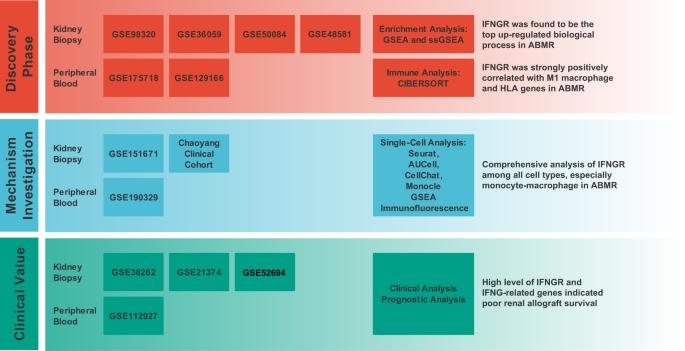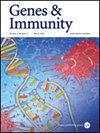干扰素-γ及其反应是肾移植术后抗体介导的排斥反应和临床结果的决定因素。
IF 5
3区 医学
Q1 GENETICS & HEREDITY
引用次数: 0
摘要
干扰素-γ(IFN-γ)是组织稳态和免疫反应中的一种重要细胞因子,但有关它在抗体介导的排斥反应(ABMR)中的作用的研究却非常有限。本研究旨在全面阐明 IFN-γ 在肾移植后 ABMR 中的作用。在六个肾移植队列中,与稳定的肾功能或异体移植物和外周血中 T 细胞介导的排斥反应相比,IFN-γ 反应(IFNGR)生物过程在 ABMR 中始终处于最高上调水平。根据单细胞分析,发现在伴有 ABMR 的异体移植物和外周血中,大多数细胞类型的 IFNGR 水平广泛升高。在患有 ABMR 的异体移植物中,M1 巨噬细胞的 IFNGR 水平最高,并且浸润严重,而肾脏常驻 M2 巨噬细胞几乎不存在。在外周血中,CD14+单核细胞的IFNGR水平最高,并且在ABMR中显著增加。免疫荧光检测显示,与非排斥反应相比,ABMR 异体移植物中的 IFN-γ 和 M1 巨噬细胞水平急剧升高。重要的是,异体移植物中的 IFNGR 水平被认为是肾移植长期存活率的一个重要风险因素。总之,这项研究系统地分析了来自十三个独立队列的多组学数据,确定了 IFN-γ 和 IFNGR 是肾移植患者 ABMR 和临床预后的决定因素。本文章由计算机程序翻译,如有差异,请以英文原文为准。

Interferon-γ and its response are determinants of antibody-mediated rejection and clinical outcomes in patients after renal transplantation
Interferon-γ (IFN-γ) is an important cytokine in tissue homeostasis and immune response, while studies about it in antibody-mediated rejection (ABMR) are very limited. This study aims to comprehensively elucidate the role of IFN-γ in ABMR after renal transplantation. In six renal transplantation cohorts, the IFN-γ responses (IFNGR) biological process was consistently top up-regulated in ABMR compared to stable renal function or even T cell-mediated rejection in both allografts and peripheral blood. According to single-cell analysis, IFNGR levels were found to be broadly elevated in most cell types in allografts and peripheral blood with ABMR. In allografts with ABMR, M1 macrophages had the highest IFNGR levels and were heavily infiltrated, while kidney resident M2 macrophages were nearly absent. In peripheral blood, CD14+ monocytes had the top IFNGR level and were significantly increased in ABMR. Immunofluorescence assay showed that levels of IFN-γ and M1 macrophages were sharply elevated in allografts with ABMR than non-rejection. Importantly, the IFNGR level in allografts was identified as a strong risk factor for long-term renal graft survival. Together, this study systematically analyzed multi-omics from thirteen independent cohorts and identified IFN-γ and IFNGR as determinants of ABMR and clinical outcomes in patients after renal transplantation.
求助全文
通过发布文献求助,成功后即可免费获取论文全文。
去求助
来源期刊

Genes and immunity
医学-免疫学
CiteScore
8.90
自引率
4.00%
发文量
28
审稿时长
6-12 weeks
期刊介绍:
Genes & Immunity emphasizes studies investigating how genetic, genomic and functional variations affect immune cells and the immune system, and associated processes in the regulation of health and disease. It further highlights articles on the transcriptional and posttranslational control of gene products involved in signaling pathways regulating immune cells, and protective and destructive immune responses.
 求助内容:
求助内容: 应助结果提醒方式:
应助结果提醒方式:


